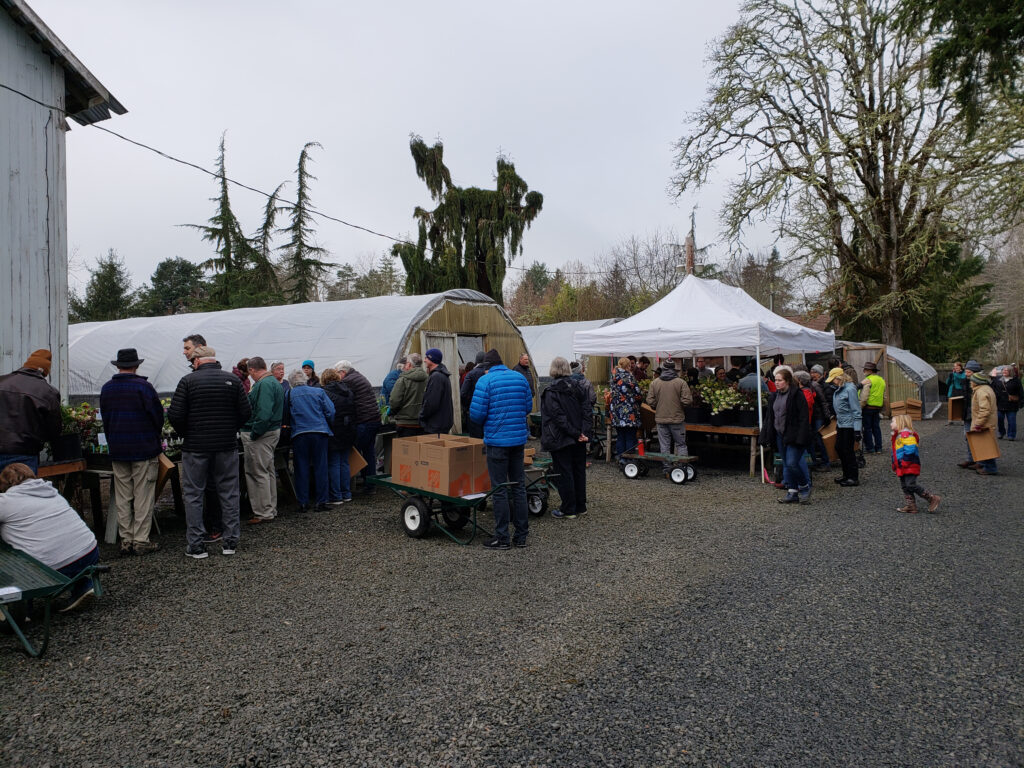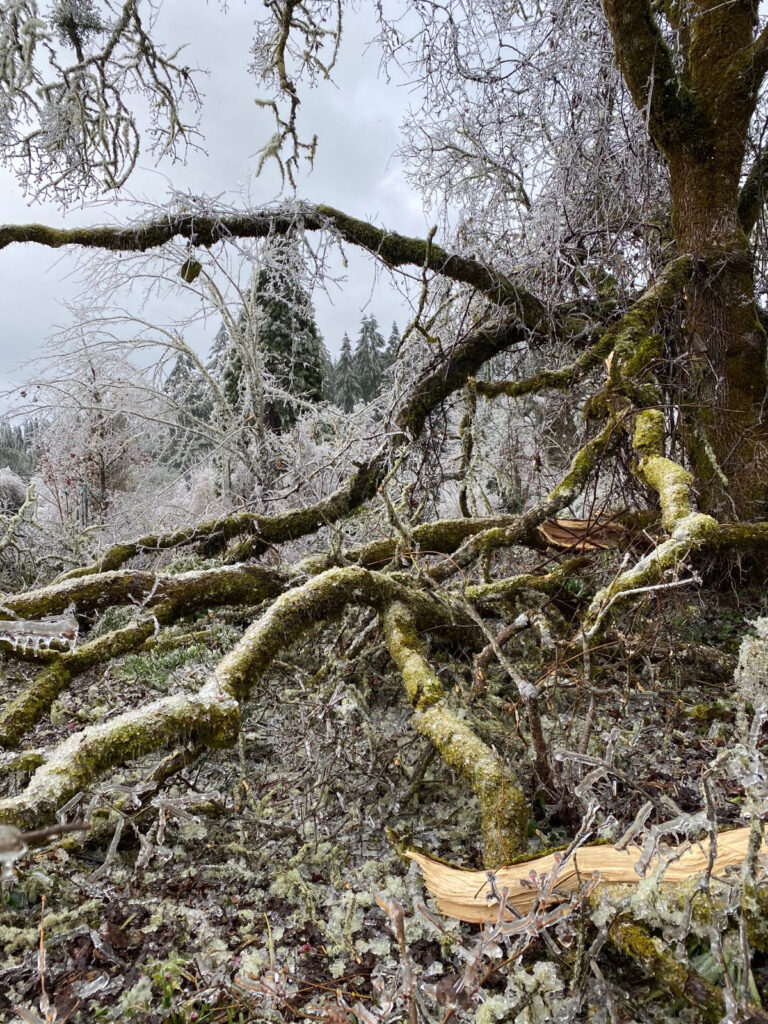Just over a year ago, on March 6, 2020, Plant Nerd Night was held for the 19th consecutive year with more than 500 attendees. Little did we know that the following week COVID-19 restrictions would begin, and Plant Nerd Night suddenly had the dubious distinction of being the only large in-person consumer gardening event that year.
Gone was Gardenpalooza, gone was the Clackamas County Master Gardeners Spring Garden Fair, gone was Hortlandia (the Hardy Plant Society of Oregon Annual Plant and Garden Art Sale), gone was the Portland Rose Society Annual Spring Rose Show, and the list goes on.
Gardeners who relied on these spring garden events as a major source of plants and inspiration suddenly had to look elsewhere. A number of garden centers also closed down temporarily; all had to change how they went about serving their customers.
If that was not enough, much of Oregon suffered from horrendous wildfires that destroyed many homes and even some towns in the late summer. The heavy smoke created an air quality that was deemed hazardous. People were told to stay indoors, and many garden centers temporarily closed again.
Then, this past February, parts of the Willamette Valley experienced an ice storm that came with a vengeance. Roads closed, trees toppled, greenhouses caved, businesses closed, residential and commercial areas lost power for multiple days, and plants were covered in ice.
I was shocked at the extensive damage that was done to plants from the ice that formed on branches and limbs. The weight of the ice caused major limbs — some the size of trees themselves — to crash to the ground. Many mature trees in my neighborhood simply fell over. Birch, maple, oak, or fir — there was no discrimination.
Disease, fire and ice. That’s a lot of disruption for one year, but that’s the thing about spring. It comes every year, and it always brings renewal. So it will be for gardening in 2021, and in fact, it’s already happening.
Each gardening season varies depending on a number of factors. Weather, of course, is high on the list.
But one thing is known for sure. During this unsettling past year, there has been a huge surge in gardening. Garden centers welcomed many novice gardeners who were spending more time at home. Many realized gardening was an activity they could still engage in to keep themselves from going stir crazy, even with COVID-19 going on.
And what’s more, the activity beautified their yards and made everyday life more pleasurable.
Retail nurseries and garden centers are invested in these customers’ success. They want to help make the gardening experience easy and rewarding, so that more people catch the gardening bug and keep it an ongoing part of their lives.
Helpful resources
Garden helplines are one top-notch resource for gardeners looking to learn and solve any problems they might encounter.
Neil Bell, of the Oregon State University Extension Service in Marion and Polk counties, told me that the Ask Extension, has been extremely popular. This is a service whereby someone can email a garden question and receive an answer from an extension agent. Pictures can be sent along with the email if there is a particular problem with a plant.
Neil said that he was surprised that even in the winter, the volume of questions did not diminish and remained high.
Gardening events are another positive resource for help, advice and inspiration.

Northwest Garden Nursery in Eugene recently held their annual Hellebore Open Garden Days. This year it was spread out over two weekends — Friday, Saturday, and Sunday for both weekends. To help alleviate crowding, they partnered with Gossler Farms Nursery in Springfield and held the event at both locations. The final tally was that both locations completely sold out of Hellebores.
Marietta O’Byrne of Northwest Garden Nursery said that for the first time, she noticed many more novices than she remembers seeing in past years. Many new people were asking basic questions about growing hellebores.
Roger Gossler echoed what Marietta said about customers asking about the fundamentals and he took that as an indicator that they had not grown hellebores before. Gossler Farms Nursery has an extensive display garden and there were many questions about some of the perennial and shrubs growing there. He felt it was a sign that there was also interest in other plants. Roger also said that their on-site sales are good, and their mail-order business has continued to be strong with no sign that it is declining.

Helping the garden recover
With damage from the ice storm and possibly even last autumn’s fires, many gardeners are looking to replace lost and damaged plants. Some retail nurseries know this feeling all too well.
Dancing Oaks Nursery in Monmouth, a retail nursery with a gorgeous display garden, suffered extensive storm damage with many large trees uprooted. A large oak was toppled and ruined a number of the plantings around it. Nonetheless, the nursery is working hard to be ready for customers.
Co-owner Leonard Foltz believes that there will be many plants sold for replacements for what has been lost to the ice storm. He joked that he hopes people also receive the gardening gene when they get their vaccinations.
Like Gossler Farms, Dancing Oaks has both a retail and online presence. Leonard said their website traffic has been steady, with many orders coming from the New England states.
Local garden centers are reporting good early season sales with vegetable seeds continuing the same strong trend as last year. It is not unusual for some vegetable seeds to already have been sold out and replenished, so it’s a good idea to go get them if you know you’re going to want them. Customers also will find the hard goods they need, including tools, soil and fertilizers related to the sale of vegetable seeds.
Color is another thing on offer at local nurseries. The appeal is understandable. It has been a long winter with many people not venturing far from their home due to the threat of COVID-19. Blooming daffodils, tulips, pansies, primrose, and more can quickly brighten up a spring day and improve the home garden.
We cannot predict the future, but certainly the nursery industry hopes the new gardeners of last year succeed. It means that they will more likely continue with their new endeavor, and out of this will form a beautiful relationship between gardener and retailer. Garden centers and seasonal resources are a great resource because they are invested in their customers’ success.
